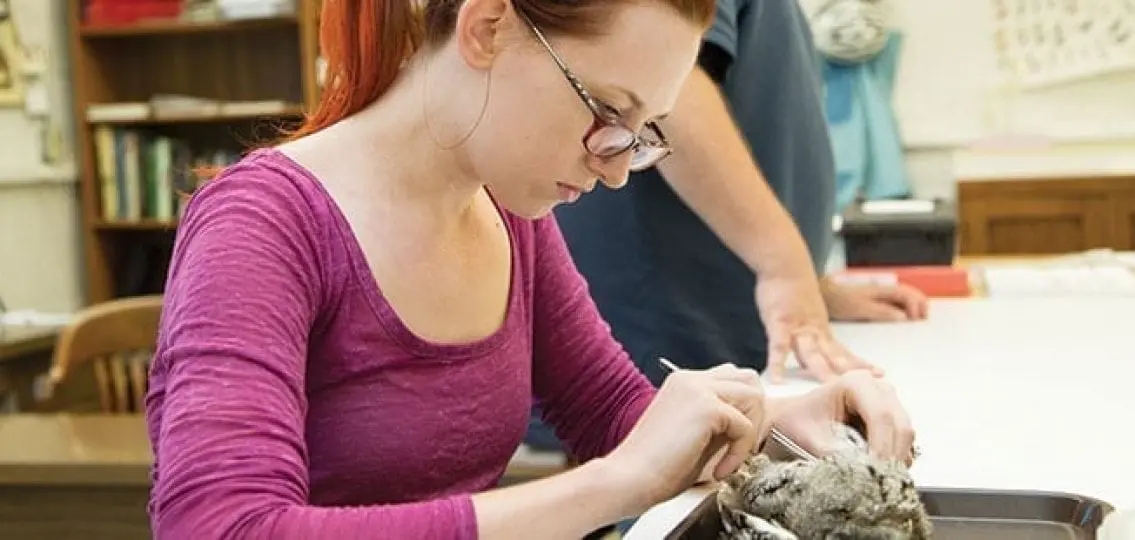High school junior Henry Buchan was working the “Please Touch” cart one Saturday, encouraging museum visitors to touch shark teeth, a dinosaur rib, and other prehistoric relics, when a young boy approached his station. Henry wasn’t prepared for what came next.
“He had come with his parents from the hospital,” says Henry, a volunteer Junior Docent at the Cleveland Museum of Natural History. “He told me he had cancer, and that on his day away from the hospital, he really just wanted to go to the Natural History Museum to learn about dinosaurs. I felt really lucky to be working with the cart that afternoon.”
Advantages Of Voluntary Work
[adrotate banner=”38″]Alice Schwallie, who manages volunteer programs at the museum, sees firsthand the positive relationships her teen volunteers develop with visitors. Furthermore, they also make valuable connections with the other volunteers, as well as with museum educators and curators.
“Our Junior Docents learn how to interact with a hugely diverse audience, as the museum attracts visitors of all ages and every background,” says Schwallie. In the process, she notes, “they build transferable skills in personal responsibility, public speaking, and time management.”
Eight Skills for Life
The empathy Henry experienced interacting with the young cancer patient is just one of the attributes teens develop through volunteering, says Marilyn Price-Mitchell, a developmental psychologist and researcher. She has identified eight key competencies teens gain from meaningful volunteer work.
“The benefits of volunteering go way beyond a college resume,” Price-Mitchell says. “A meaningful volunteer job can be transformative to a teen’s identity and personal growth. They can develop abilities like curiosity, creativity, resourcefulness, integrity, and empathy.

While volunteering benefits all teens, Price-Mitchell believes, it often especially helps kids who struggle with low self-esteem, poor grades, or underdeveloped social skills “because it gives them exposure to meaningful activities outside of home and school, and to potential adult mentors.”
How Parents Can Help
Parents can guide their teen toward a meaningful volunteer experience. They can help them zero in on what interests them most: Children or the elderly? Animals or the environment? A potential career in medicine or education? Helping the underserved or furthering a cause they believe in? Whatever the interest, Price-Mitchell offers these three guidelines for selecting a good volunteer activity:
- The activity should be intellectually or emotionally challenging to your teen.
- It needs to provide an emotional connection and meaning so your teen finds it fulfilling.
- There needs to be adult support. Adult mentoring provides the necessary scaffolding for teens to learn new skills and believe in themselves.
How Does Volunteering Help You Grow: Real World Skills
Henry’s interest in the natural sciences made volunteering at the Cleveland Museum of Natural History a, well, natural fit. “I like science, and I enjoy being able to teach kids about various items that are featured at the museum,” he says. Even though he’s busy with schoolwork, varsity sports, and robotics competitions, he happily fulfills his two-shifts-per-month commitment.
“I’m often worried about homework or school or practice,” says Henry. “But with volunteering, I have this time where I only focus on others. As a result, it just leaves me in a really good mood.”
Henry also appreciates having a more “real world” setting in which to explore his interests and interact with peers and adults.
“I was attending a very small school when I started, so I enjoyed meeting a lot of different kids in the Junior Docent training program,” he says.
Whether your teen is shy or outgoing, bound for college or the workplace, volunteering can help them explore their interests now, and cultivate skills that can benefit them for a lifetime.




